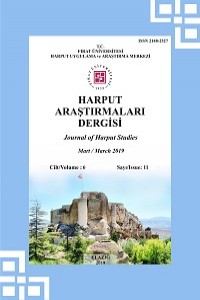Öz
Sosyal yaşantının hızlı ve baş döndürücü değişimine rağmen kültür toplumun hangi medeniyet seviyesinde bulunursa bulunsun insanların gündelik yaşantısını şekillendiren inanç ve ahlaki yapılarını olağanüstü varlıklarla olan ilişkilerinin yer aldığı mitik ve ritüelistik dünyadan kopamadıklarını göstermiştir. Kültürel çeşitliliğin/zenginliğin korunmasına yönelik çalışmaların kökeni çok eskiye gitmekle beraber dünya çapında evrensel bir bakışla sistemleştirilip taraf ülkelerin bir takım taahhütlerde bulunduğu Somut Olmayan Kültürel Miras Sözleşmesi 17 Ekim 2003 tarihinde kabul edilmiştir. Ülkemiz bu sözleşmeye 19 Ocak 2006 tarihinde imza atmış, 27 Mart 2006 tarihinde de taraf ülke olmuştur.
Sözlü kültür, insanlığın belleğidir ve toplumların devamının olmazsa olmazıdır. Toplumların genetik kodları olan sosyal norm diyebileceğimiz örf-adet-gelenek-görenek-töre ve teamüller bireyleri bağlı bulunduğu kültürel daire içerisinde tutan ve aidiyet duygusunu yerleştirerek ortak bir gelecek kaygısı gütmelerini sağlayan uyulmadığı takdirde yaptırımı olan uygulamalardır. Bunların korunması, bilinmesine ve yaşatılmasına bağlıdır. İletişim teknolojisinin hızla gelişmesiyle, sözlü geleneğimizde yer alan anlatı türleri ve geleneğe bağlı olarak şekillenen inanç, ayin, tören, günlük yaşama dair uygulamalar unutulmaya yüz tutmuştur. Bugün hükümetlerin belki de en büyük sorunu kültür aktarımını yapabilecek mekanizmaları göz ardı etmeleri, toplumun görünmez mayası sosyal normları gelecek kuşaklara aktarılmasını sağlayamamasıdır. Bu yazıda amaç kültürel kimliği ile yüzyıllardır var olan kadim şehir Harput’a ait birkaç küçük örnekle aktarımın sağlanmasına yönelik sorunlara ve çözüm yollarına dikkat çekmektir.
Anahtar Kelimeler
Kaynakça
- AZAR, Birol, Elazığ Manileri Üzerine Bir İnceleme, (Yüksek Lisans Tezi) Elazığ 1995.
- AZAR, Birol, Bir Aidiyet İfadesi: Bize Harputlu Derler”, Geçmişten Geleceğe Harput Sempozyumu, 23-25 Mayıs Elazığ 2013, Elazığ 2013, s. 193-200.
- BURAN, Ahmet, “Fırat Havzasında Yağmur Duası ve Yada Taşı”, II. Folklor ve Etnoğrafya Sempozyumu 5-7 Kasım 1987, Elazığ 1989, s.63-71.
- DUMAN, Ayşe, Elazığ Ninnileri (İnceleme-Metin), (Yüksek Lisans Tezi), Elazığ 1996.
- GÖKTOLGA, Oğuz, Postmodernite ve Siyasal Kimlikler. Bilsam Yay. İstanbul 2012.
- GÖRKEM, İsmail, “Sözlü Kültür Geleneği Açısından Elazığ Bilmeceleri”, Dünü ve Bugünüyle Harput Sempozyumu, C.1, Türkiye Diyanet Vakfı Elazığ Şubesi Yay., Elazığ 1999, s.485.
- MENGÜŞOĞLU, Metin Önal, Harput Şehrengizi, Beyan Yay., Ankara 2000.
- OĞUZ, M.Öcal vd., Türk Halk Edebiyatı El Kitabı, Grafiker Yay., Ankara 2015.
- ÖZER, Edip-Hüsamettin Kaya vd., Elazığ Halk Oyunları, Elazığ Kültür Kurultayı Yay., Elazığ 2004.
- ŞİMŞEK, Esma, “Anadolu’da Yağmur Duasına Bağlı Olarak Oynanan Bir Oyun Çömçeli Gelin”, Milli Folklor, Yıl 15, Sayı 60, Ankara 2003, s.78-87.
- TAN, Şeref, Hadi Harput’a Gidek, Çağ Ofset Elazığ 1997.
- TURGUT, M. Ebru, Elazığ Çocuk Oyunlarının Halk Bilimi Açısından İncelenmesi, (Yüksek Lis.Tezi), Elazığ 2005.
- YALÇIN, Alemdar-Gıyasettin AYTAŞ, Çocuk Edebiyatı, Akçağ Yay. Ankara 2012.
Öz
Although the rapid and dazzling change of social life, culture researches have shown that regardless of the civilization level of the society, people cannot rupture of their faith and moral structures that shape their daily life from the mystic and the ritualistic world at where their relations with extraordinary creatures exist. Despite the origin of the studies for protecting the cultural diversity/ richness goes back a long way, Intangible Cultural Heritage Convention, which was systematized with a universal approach all around the world and party countries made several commitments, was approved on 17 October 2003. Our country signed this convention on 19 January 2006 and became a party country on 27 March 2006.
Oral culture is the memory of people and indispensable for the perpetuity of the societies. Custom-ritual-tradition-folkway-manners and practices, which we can name as social norms that are the genetic codes of societies, are the implement-tations that hold people in the cultural circle which they belong. Additionally, they allow the people to pursue a common concern for the future by implementing the sense of belonging and also they are binding if not obeyed. Protection of these is contingent upon their being known and sustained. With the rapid development of the communication technology, the narrative types existing in our oral tradition and the implementations depending on the custom such as belief, rite, ceremony and practices for daily life sank into oblivion. Nowadays, ignoring the mechanisms for transferring the culture and inability to provide transfer of the social norms that are the invisible attributions of the society to the next generations may be the most important problems of governments. The purpose of this article is to draw attention to the problems and solutions for providing the transfer of culture with several examples about Harput which is an ancient town existing for centuries with its cultural identity.
Anahtar Kelimeler
Kaynakça
- AZAR, Birol, Elazığ Manileri Üzerine Bir İnceleme, (Yüksek Lisans Tezi) Elazığ 1995.
- AZAR, Birol, Bir Aidiyet İfadesi: Bize Harputlu Derler”, Geçmişten Geleceğe Harput Sempozyumu, 23-25 Mayıs Elazığ 2013, Elazığ 2013, s. 193-200.
- BURAN, Ahmet, “Fırat Havzasında Yağmur Duası ve Yada Taşı”, II. Folklor ve Etnoğrafya Sempozyumu 5-7 Kasım 1987, Elazığ 1989, s.63-71.
- DUMAN, Ayşe, Elazığ Ninnileri (İnceleme-Metin), (Yüksek Lisans Tezi), Elazığ 1996.
- GÖKTOLGA, Oğuz, Postmodernite ve Siyasal Kimlikler. Bilsam Yay. İstanbul 2012.
- GÖRKEM, İsmail, “Sözlü Kültür Geleneği Açısından Elazığ Bilmeceleri”, Dünü ve Bugünüyle Harput Sempozyumu, C.1, Türkiye Diyanet Vakfı Elazığ Şubesi Yay., Elazığ 1999, s.485.
- MENGÜŞOĞLU, Metin Önal, Harput Şehrengizi, Beyan Yay., Ankara 2000.
- OĞUZ, M.Öcal vd., Türk Halk Edebiyatı El Kitabı, Grafiker Yay., Ankara 2015.
- ÖZER, Edip-Hüsamettin Kaya vd., Elazığ Halk Oyunları, Elazığ Kültür Kurultayı Yay., Elazığ 2004.
- ŞİMŞEK, Esma, “Anadolu’da Yağmur Duasına Bağlı Olarak Oynanan Bir Oyun Çömçeli Gelin”, Milli Folklor, Yıl 15, Sayı 60, Ankara 2003, s.78-87.
- TAN, Şeref, Hadi Harput’a Gidek, Çağ Ofset Elazığ 1997.
- TURGUT, M. Ebru, Elazığ Çocuk Oyunlarının Halk Bilimi Açısından İncelenmesi, (Yüksek Lis.Tezi), Elazığ 2005.
- YALÇIN, Alemdar-Gıyasettin AYTAŞ, Çocuk Edebiyatı, Akçağ Yay. Ankara 2012.
Ayrıntılar
| Birincil Dil | Türkçe |
|---|---|
| Bölüm | Araştırma Makalesi |
| Yazarlar | |
| Yayımlanma Tarihi | 11 Haziran 2019 |
| Yayımlandığı Sayı | Yıl 2019 Cilt: 6 Sayı: 11 |


